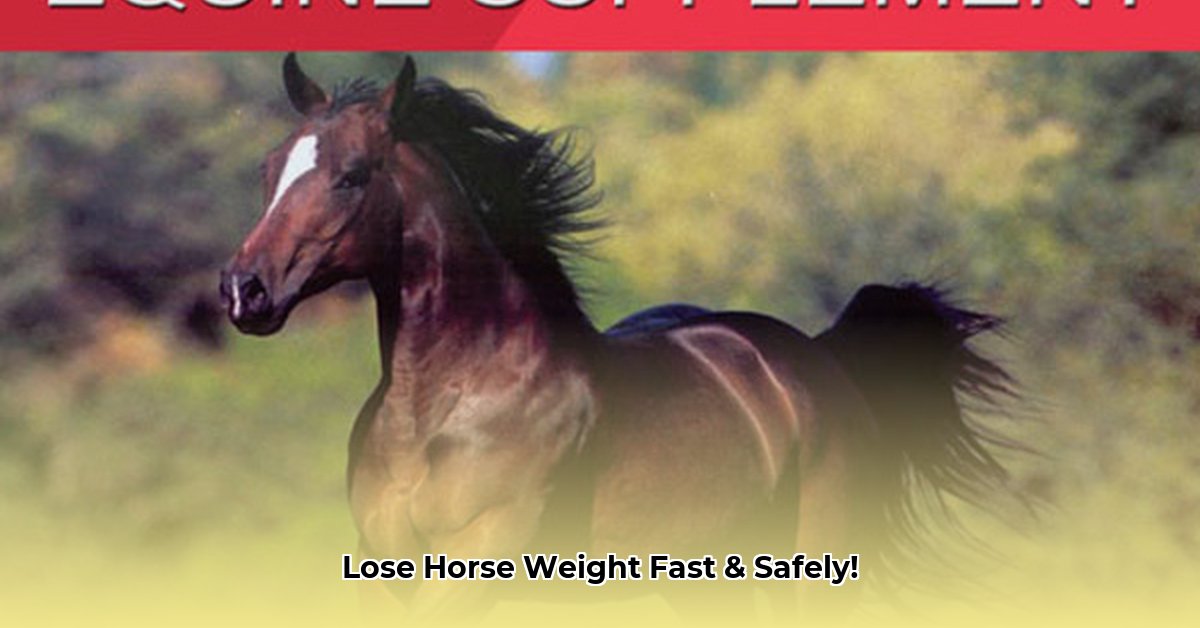
Understanding Equine Weight Management: A Holistic Approach
Losing weight for your horse isn't a quick fix; it's a journey requiring patience and a thoughtful, holistic approach. Rapid weight loss can be harmful, so prioritizing your horse's well-being is paramount. This guide will explore safe and effective strategies to help your equine companion achieve a healthy weight.
Is your horse carrying extra weight? Equine obesity significantly impacts their health, affecting joints, metabolism, and overall well-being. It's not just about aesthetics; it's about their long-term health. Before considering supplements, let's establish a strong foundation.
Assessing Your Horse's Weight
How do you determine if your horse is overweight? A veterinarian can assess their body condition score (BCS), providing crucial data on fat reserves. Online resources and veterinary professionals can help you interpret BCS charts, allowing you to accurately gauge your horse’s weight. Regular monitoring, using a weight tape, is vital for tracking progress.
Dietary Strategies: The Cornerstone of Success
A successful weight-loss plan hinges on proper nutrition. Your horse requires 24/7 access to high-quality forage (hay or pasture). This provides sustained energy and fiber, crucial for digestive health. But quality matters. We need to minimize Non-Structural Carbohydrates (NSCs) – sugars and starches that contribute to weight gain and metabolic issues like insulin resistance.
What type of forage is best for weight loss? A hay analysis will reveal the NSC levels in your horse's feed. This allows for informed choices about forage type and quantity. Timothy hay typically contains lower NSCs than alfalfa, making it a better choice for weight management. Talk to your vet or an equine nutritionist to develop a personalized dietary plan considering your horse's specific needs.
Processed feeds (oats, corn) should be used sparingly. They are energy-dense and often high in sugars and starches, and contribute to unnecessary weight gain. Focus on providing a balanced diet tailored to your horse's weight-loss goals. This isn't about deprivation; it's about providing precisely what your horse needs to thrive at a healthy weight.
Exercise: Movement is Medicine for Your Horse
Exercise is crucial beyond calorie burning; it strengthens muscles, supports joint health, and provides essential mental stimulation. Start slowly, gradually increasing activity levels. A veterinarian or equine professional can create a safe and effective exercise plan tailored to your horse’s fitness level. Avoid overexertion, which could cause injury.
How much exercise does my horse need? The answer depends on several factors, including age, breed, and overall health. A slow and steady approach to increasing activity levels is always best. Remember, gradual improvements are sustainable improvements.
The Role of Supplements: A Supportive Role, Not a Replacement
Supplements are not magic bullets. They are supportive tools, not replacements for a healthy diet and exercise regimen. They should be considered only after a complete veterinary assessment, which must include blood work to identify any underlying nutritional deficiencies.
Are supplements necessary for my horse's weight loss? Only after a veterinarian determines potential deficiencies (e.g., chromium, zinc, or L-carnitine) should supplements be considered. Even then, they serve as a secondary measure, working in conjunction with a balanced diet and exercise program. Never use weight-loss supplements without veterinary guidance.
Veterinary Check-Up: The Foundation of a Successful Plan
Before any weight-loss program, a comprehensive veterinary examination is non-negotiable. Blood work rules out underlying medical conditions that might be affecting your horse's metabolism and weight. Your vet helps develop a safe plan and monitors progress, adjusting accordingly. This collaborative approach is crucial for success.
Why is a veterinary checkup so important? It ensures that your horse's weight loss journey is safe and effective, allowing for early detection of potential problems. A veterinarian can tailor a plan to your horse's unique needs, ensuring a healthy weight loss.
Monitoring Progress: Patience and Consistency
Gradual weight loss is safest and healthiest. Regularly check your horse's BCS using a scoring chart and weigh them using a weight tape. Consistent monitoring is key. Note any changes in behavior or health, reporting them immediately to your veterinarian.
How often should I monitor my horse's weight? Weighing your horse weekly and assessing their BCS monthly will provide a good overview of progress. Don't rush the process. Patience, consistency, and veterinary guidance are your best allies in this journey. Remember, successful weight management is a long-term commitment to your horse's overall health and happiness.